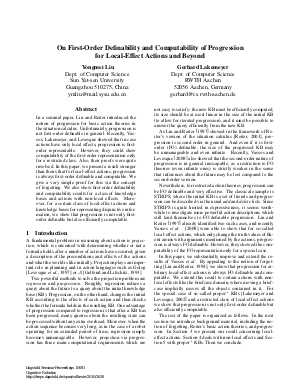On First-Order Definability and Computability of Progression for Local-Effect Actions and Beyond
Authors Yongmei Liu, Gerhard Lakemeyer
-
Part of:
Volume:
Dagstuhl Seminar Proceedings, Volume 10081
Part of: Series: Dagstuhl Seminar Proceedings (DagSemProc) - License:
 Creative Commons Attribution 4.0 International license
Creative Commons Attribution 4.0 International license
- Publication Date: 2010-10-27
File

PDF
DagSemProc.10081.12.pdf
- Filesize: 186 kB
- 7 pages
Document Identifiers
Subject Classification
Keywords
- Action and change
- knowledge representation
Metrics
- Access Statistics
-
Total Accesses (updated on a weekly basis)
0Document
0Metadata
Abstract
In a seminal paper, Lin and Reiter introduced the notion of progression for basic action theories in the situation calculus. Unfortunately, progression is not first-order definable in general. Recently, Vassos, Lakemeyer, and Levesque showed that in case actions have only local effects, progression is firstorder representable. However, they could show computability of the first-order representation only for a restricted class. Also, their proofs were quite involved. In this paper, we present a result stronger than theirs that for local-effect actions, progression is always first-order definable and computable. We give a very simple proof for this via the concept of forgetting. We also show first-order definability and computability results for a class of knowledge bases and actions with non-local effects. Moreover, for a certain class of local-effect actions and knowledge bases for representing disjunctive information, we show that progression is not only firstorder definable but also efficiently computable.
Cite As Get BibTex
Yongmei Liu and Gerhard Lakemeyer. On First-Order Definability and Computability of Progression for Local-Effect Actions and Beyond. In Cognitive Robotics. Dagstuhl Seminar Proceedings, Volume 10081, pp. 1-7, Schloss Dagstuhl – Leibniz-Zentrum für Informatik (2010)
https://doi.org/10.4230/DagSemProc.10081.12
BibTex
@InProceedings{liu_et_al:DagSemProc.10081.12,
author = {Liu, Yongmei and Lakemeyer, Gerhard},
title = {{On First-Order Definability and Computability of Progression for Local-Effect Actions and Beyond}},
booktitle = {Cognitive Robotics},
pages = {1--7},
series = {Dagstuhl Seminar Proceedings (DagSemProc)},
ISSN = {1862-4405},
year = {2010},
volume = {10081},
editor = {Gerhard Lakemeyer and Hector J. Levesque and Fiora Pirri},
publisher = {Schloss Dagstuhl -- Leibniz-Zentrum f{\"u}r Informatik},
address = {Dagstuhl, Germany},
URL = {https://drops.dagstuhl.de/entities/document/10.4230/DagSemProc.10081.12},
URN = {urn:nbn:de:0030-drops-26380},
doi = {10.4230/DagSemProc.10081.12},
annote = {Keywords: Action and change, knowledge representation}
}
